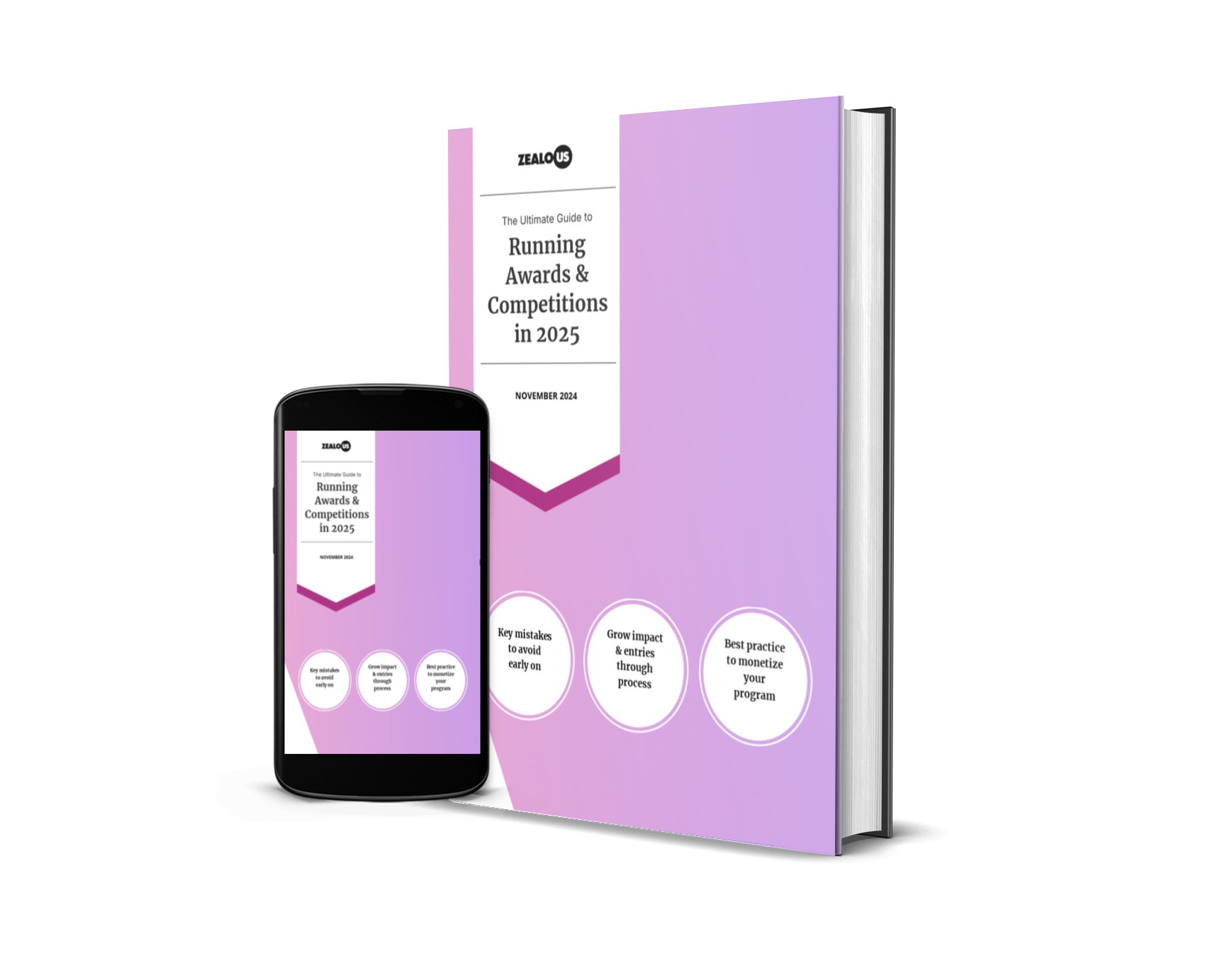You’re planning to launch an award or competition because you want to engage with your community and reach out to new audiences to expand your network. So what tools do you use to start managing your initiative?
We’ve listed five categories of tools worth looking to see which one might be right for you.
Online forms

- Easy, quick to launch
- Most affordable in terms of cost of tools
Online forms like Google forms, Jotform and Wufoo are great to kick things off. You can start collecting your application forms immediately without any training and unlikely to have any technical difficulties. The downside is that if you’re asking applicants to submit images, videos and have a judging panel, you’ll need to think about how you’re going to collect these files and put them together for the judges to review and how you’re going to keep managing the scores. If you’re only expecting a few submissions or your application form is simple, online forms are great, but if you’re asking for different file types, taking fees etc you’ll need to look for other tools and think about how to integrate this manually into your process. Online forms are great when you’re not expecting many submissions, have simple entry requirements and want to launch asap with low barriers to entry.
Project Management tools

- Great for keeping on top of the general overview of the project, especially for managing specific tasks
- Lower learning curve if you’ve already use this tool for other projects
Trello, Asana and Monday.com are some Project Management tools would allow you to track your entries and manage your judging process. You’re able to break down the various tasks in a centralized place to communicate and coordinate with others. Its a great tool if you’re already using it as it can be launched immediately with no extra training (lower learning curve). However, be prepared to set aside some time and using your technical hat for creating spreadsheets (judges scores), presentations (for collating entries), and keeping on track of all channels of communication from judges and applicants that may be in multiple places. This may be prone to some human error whether it is being updated. Project Management tools are excellent to keep on top of all the tasks involved in managing your initiative and keeping the process itself organized but you’ll still need some tools external to this.
Customer Relationship Management tools

- Managing your contacts and their activities in one place made accessible for all internal parties
- Automations and further streamlining process through some integrations
One of the great advantages of using a Customer Relationship Management software is that all your data concerning your contacts will be in one place and your team won’t need to learn a new tool either. If your stakeholders are already in your database, all that information is already available too which means no one should be missing any crucial information about that candidate/judge and its all accessible from one place. Some integration with other tools are available too, which might be useful if you’re also tracking payment. However, expect some manual if you require a sophisticated judging process e.g. scoring criteria or if judges are asked to score videos, images and forms together, as these need to be prepared by administrators and will have to be updated accordingly. Overall, a great tool for managing the overall project, keeping data in one place, having consistent communication between both external and internal parties that may have a low learning curve if you’re already using a CRM.
Insights like these straight to your inbox
Receive weekly tips from our founder to grow your program’s impact; regardless of what tools you use.
Submissions Management Platform / Award Management Platform

- Most functionalities already considered and available i.e. no need to build from scratch
- Taking submissions, managing judging, taking payments from one centralised place
Submissions Management platforms are robust enough for you to manage your entries and your stakeholders from one centralised place. The need to use any other external tools outside of the platform will be limited as you will be able to take submissions, review, judge and select entries from one place, so no need to create presentations for judges to score, managing the scores on an excel sheet or taking/managing payments through a different platform. With a lot automated, risk for human error or time needed to unexpectedly needing to double or triple check things will be reduced. With much of the process automated, the risk of human error and the need for unexpected double or triple checks will be significantly reduced. While full customisation may not always be possible when using a third-party platform, you’ll benefit from automatic updates designed to manage your initiative more efficiently, and you’ll likely receive support as an administrator, judge, or applicant. You can also rely that you’ll be able to continue growing your submissions as they can handle large volumes of entries, perfect for growing your initiative. Zealous, Awardforce, Evalato and Submittable are some examples of Submissions management platforms.
For ambitious organizations specifically focused on awards programs, our awards management platform provides specialized features including automated judging workflows, comprehensive reporting, and advanced analytics designed specifically for the awards lifecycle.
Custom built site

- All functions and processes can be built specifically for your needs
- Branding and look to your exact requirements
Tailor-made website solutions are built for your exact needs so the journey for all cohorts (administrator, applicant and judges) should be seamless and intuitive and built around your audiences needs. Any need for bespoke functions will be met and you will have flexibility that matches your process from start to finish, whether it is from your marketing or administrative perspective like branding and integrating it to your website and measuring traffic all the way to how the downloadable reports are formatted. This should be the pinnacle of your needs but simultaneously it can be quite costly. In addition to initial set up costs there may be yearly maintenance costs and new features may be extra too (are they annual or do they offer flexibility). A custom-built site with niche features like submission handling, judge invitations, and scoring requires assurance that the company will offer this in the longer term. Enquire how ‘specialized’ they are in this field or what proportion of their business come from this type of product. If its not a core business, there is also a risk of them opting out of providing this business too.
Summary
You dont have time and your project should have been launched yesterday so you’re eager to quickly get it off the ground. But planning now can save you time later so it may be good to ask:
- What is your top objectives now and could your new tool help solve these specific goals
- Do you really have the time, capacity and knowledge to build or plan the process from scratch (and does that tool allow you to meet your deadline)
- Would you need support before your launch or during your initiative whether it be technical or for advise
- Identify what your needs and experience of your applicants and judges and what is the best tool to provide them a seamless and enjoyable experience
- Does the pricing offer you value for what you need.
One of our clients at Zealous highlighted the importance of investing in software for today and tomorrow, not today and yesterday—a perspective we fully support. Choosing future-focused solutions is essential for ensuring long-term efficiency and growth.
Ready to upgrade from basic tools to a comprehensive awards management solution?
We can help!
Zealous makes running your programmes easier
But we’re not alone in the space – here are 8 others you may wish to consider (even if we would prefer you choose us!).
Want us to write more content like this? Give it a like
Share












